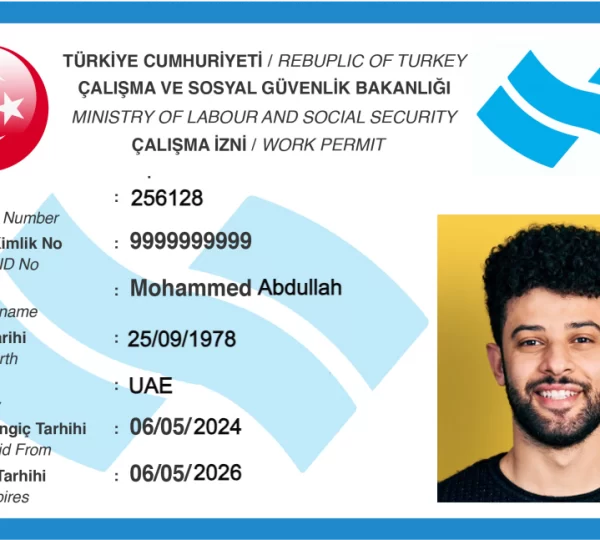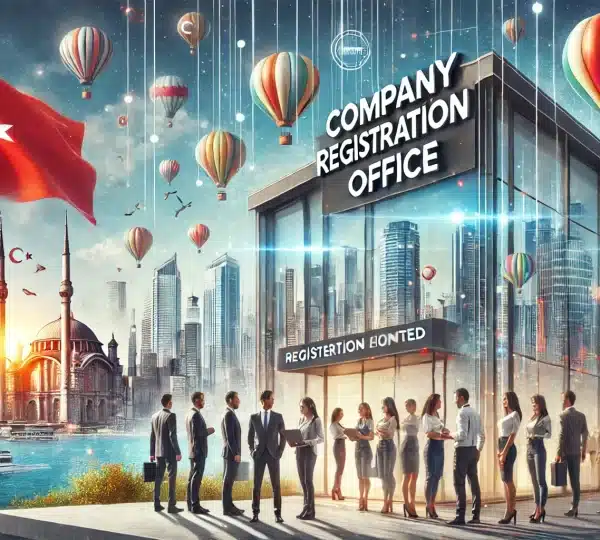
Construction Company in Turkey
Construction Company in Turkey: Build Your Future in Turkey
Starting a construction company in Turkey offers significant growth opportunities, driven by the country’s booming infrastructure projects, urban development, and real estate market. Whether you are a local entrepreneur or an international investor looking to tap into the Turkish construction sector, this guide will help you navigate the essential steps, legal requirements, and benefits of operating a construction company in Turkey.
Table of Contents
Why Start a Construction Company in Turkey?
The construction sector is one of the most dynamic industries in Turkey, contributing significantly to the country’s economy. With strategic government projects like the Istanbul Canal, airport constructions, and numerous urban regeneration projects, Turkey offers a vast market for construction companies.

Key Drivers for Growth in Turkey's Construction Sector
- Government Investments: The Turkish government continues to prioritize infrastructure development, allocating substantial funds to housing, transportation, and energy projects.
- Urbanization: Turkey’s rapidly growing population and urbanization create constant demand for new housing and commercial real estate.
- Strategic Location: Turkey’s location between Europe, Asia, and the Middle East makes it a gateway for international construction companies looking to expand their operations.
- Tourism and Real Estate: The robust tourism sector and the increasing demand for vacation homes and luxury residences add to the construction opportunities.
- Foreign Investment: With favorable regulations for foreign investors, Turkey encourages international companies to establish a construction business or invest in ongoing projects.
Legal Requirements to Start a Construction Company in Turkey
To start a construction company in Turkey, you must meet certain legal obligations. These include company registration, obtaining the necessary licenses, and ensuring compliance with industry regulations.
1. Choosing the Right Company Structure
The first step is selecting the appropriate legal structure for your business. In Turkey, the most common forms of business entities include:
- Limited Liability Company (LLC): The most preferred option for construction companies due to its flexible structure and relatively low capital requirements.
- Joint-Stock Company (JSC): Suitable for larger construction projects and investors, a JSC can issue shares to the public.
- Branch Office: International construction firms can set up branch offices in Turkey to oversee local projects.
2. Company Registration Process
The company registration process involves several key steps, typically completed within 1-2 weeks:
- Trade Name Reservation: You must first reserve a unique trade name with the Turkish Trade Registry.
- Articles of Association: Draft and notarize the company’s articles of association.
- Capital Deposit: Deposit the minimum share capital (typically 50,000 TRY for an LLC and 250,000 TRY for an JSC).
- Register with the Trade Registry: Submit all necessary documents to the Trade Registry Office and obtain your registration certificate.
- Tax Registration: You will need to register your company with the Turkish Tax Authority to obtain a tax identification number.
- Chamber of Commerce Membership: It is mandatory to become a member of the local Chamber of Commerce.
3. Construction Permits and Licenses
To operate legally, a construction company must acquire specific permits and licenses. These include:
- Construction Permit (İnşaat Ruhsatı): Issued by local municipalities for specific construction projects. You must submit architectural plans, engineering reports, and environmental assessments.
- Workplace License: Your office or headquarters will require a workplace license from local authorities.
- Zoning and Environmental Compliance: Ensure that your projects comply with Turkey’s zoning laws and environmental regulations.
4. Hiring and Labor Regulations
Turkey has a highly skilled labor force, but it’s essential to comply with labor regulations, including:
- Social Security Registration: All employees must be registered with Sosyal Güvenlik Kurumu (SGK) for social security contributions.
- Employment Contracts: Ensure that all employment contracts are compliant with Turkish labor laws.
- Work Permits for Foreign Employees: If hiring foreign workers, ensure they have valid work permits issued by the Ministry of Labor.
5. Costs and Capital Requirements
Starting a construction company in Turkey involves various costs:
- Company Formation Costs: The total cost to register a company is approximately 2,000-3,000 EUR, which includes notary fees, trade registry fees, and legal advisory costs.
- Office Setup Costs: Depending on the location, office rental costs vary, with Istanbul being the most expensive city.
- Initial Capital: While the minimum capital for an JSC is 250,000 TRY, large-scale construction projects require significantly more capital for equipment, staffing, and permits.
The Role of the Turkish Government in the Construction Industry
The Turkish government is the largest player in the construction sector with its Build-Operate-Transfer(BOT) model
The Build-Operate-Transfer (BOT) model has become a vital tool for Turkey in addressing its infrastructure needs while leveraging private sector investment and expertise.
From bridges and airports to energy and healthcare infrastructure, the BOT model has accelerated the growth and modernization of Turkey’s infrastructure.
With a clear legal framework, active public-private partnerships, and a proven track record of success, the BOT model is likely to remain a key approach for future projects in Turkey’s rapidly growing economy.
The BOT Model in Turkey
Legal Framework
Turkey has a well-established legal framework that supports the BOT model. The Law on the Regulation of Concessions and the Law No. 3996 (Governing the Privatization of Public Services) are key regulations that govern BOT projects. These laws outline the processes for bidding, project approval, and implementation in collaboration with public entities.
Public-Private Partnerships (PPP)
The BOT model is a subset of Public-Private Partnerships (PPP), which are commonly used in Turkey to develop large infrastructure projects. These PPP agreements typically involve collaboration between government authorities and private firms to finance, build, and operate projects for public benefit.
Key Features of the BOT Model
Private Sector Involvement: The BOT model allows private companies to finance, construct, and operate a project for a certain period, typically through a concession agreement with the government.
Project Ownership Transfer: After the agreed-upon concession period, ownership and operation rights of the infrastructure are transferred back to the government.
Revenue Generation: During the operation phase, the private company collects revenue (e.g., tolls, user fees) to recoup its investment and generate profits.
Risk Distribution: Risks such as financing, construction, and operational risks are typically borne by the private company, while political and regulatory risks may be managed by the government.
Types of BOT Projects in Turkey
a. Transportation Projects
- Highways and Roads: Major highways such as the Istanbul-Izmir Highway and Gebze-Orhangazi-Izmir Motorway were developed under the BOT model. These projects involve tolls collected from users during the operational phase.
- Bridges: Iconic structures like the Yavuz Sultan Selim Bridge (Third Bosphorus Bridge) and Osman Gazi Bridge were also constructed using the BOT model.
- Airports: Turkey’s aviation infrastructure, including the development of Istanbul’s New Airport (Istanbul Airport), has benefitted from the BOT model.
b. Energy Projects
- Power Plants: Several energy projects, including hydroelectric and thermal power plants, have been developed under the BOT model. This model enables private companies to invest in and operate energy generation facilities, ensuring energy supply to the country.
c. Healthcare Infrastructure
- City Hospitals: Turkey has implemented large-scale healthcare infrastructure projects using the BOT model. Examples include the construction of Ankara City Hospital and Istanbul Basaksehir City Hospital, which were developed by private companies and operated under the BOT system for a specific period.
Benefits of the BOT Model for Turkey
Financing Without Upfront Public Investment: One of the biggest advantages of the BOT model is that the government doesn’t need to allocate significant funds for project initiation. The financial burden is transferred to the private sector.
Improvement of Public Infrastructure: The BOT model has enabled the rapid development of critical infrastructure projects, which improves the country’s transportation network, energy supply, and healthcare facilities.
Risk Transfer to Private Sector: The BOT model shifts financial, construction, and operational risks to the private sector, reducing the burden on the public sector.
Revenue Generation for Both Parties: Private companies earn revenue during the concession period (e.g., tolls, fees), while the government benefits in the long term through ownership of the project post-concession.
Attracts Foreign Investment: The BOT model is attractive to both domestic and foreign investors, allowing the Turkish government to attract private capital for large-scale projects.
Challenges and Considerations of the BOT Model
Risk of Underperformance: If private companies mismanage or underperform, the quality of the service or infrastructure may suffer, potentially causing issues before the transfer to the government.
Public Resistance to Tolls or Fees: Projects like toll roads or bridges may face resistance from the public due to the additional costs users have to pay.
Long-Term Financial Viability: Some projects may face difficulties in generating the expected revenue, especially if economic conditions change or if traffic volumes or usage rates are lower than forecasted.
Complex Contracts: BOT agreements are highly complex, involving various stakeholders, risk-sharing mechanisms, and long-term commitments. Legal and financial frameworks must be robust to ensure successful project implementation.
Opportunities for Foreign Investors for Construction Industry in Turkey
Turkey has relaxed its regulations to encourage foreign direct investment (FDI), especially in the construction sector. International investors can fully own a construction company in Turkey without needing a local partner. Additionally, the Turkish government offers various incentives, such as tax reductions, customs duty exemptions, and subsidies for certain projects.
Key Benefits for Foreign Investors:
- No Restriction on Foreign Ownership: Foreigners can own 100% of a construction company.
- Double Taxation Treaties: Turkey has signed agreements with various countries to avoid double taxation, making it easier for foreign investors to operate.
- Free Zones and Investment Incentives: Foreign companies investing in specific Free Trade Zones (FTZ) or certain industries may enjoy reduced tax rates or exemption from VAT and customs duties.
- Reduced VAT Rates: Turkey’s tax laws provide a source of financing for companies in the construction sector by providing a refund of VAT that companies incur and cannot offset through deductions.
Challenges in the Turkish Construction Industry
Despite the lucrative opportunities, the construction industry in Turkey faces several challenges, including:
- Economic Fluctuations: Turkey’s economy is subject to periodic volatility, which can affect real estate prices and the cost of raw materials.
- Bureaucracy: Navigating Turkey’s bureaucratic processes, especially when acquiring permits, can be time-consuming.
- Competition: The Turkish construction sector is highly competitive, with both local and international players striving for major contracts.
- Currency Fluctuations: Exchange rate instability may impact the cost of imported materials and labor expenses for foreign investors.
Growth Sectors in Turkish Construction Industry
1. Infrastructure Projects
Turkey continues to invest in large-scale infrastructure, such as highways, bridges, tunnels, and airports. International construction companies can participate in public-private partnerships (PPPs) or government tenders for infrastructure projects.
2. Residential and Commercial Real Estate
The demand for residential housing in urban areas like Istanbul, Ankara, and Izmir remains strong due to Turkey’s growing population and urbanization. In addition, the commercial real estate market, including shopping malls, office buildings, and hotels, is expanding, providing more opportunities for construction companies.
3. Green and Sustainable Building Projects
As sustainability becomes a key focus worldwide, there is increasing demand for eco-friendly and energy-efficient buildings in Turkey. Construction companies with expertise in green building practices, solar installations, and sustainable architecture are in a strong position to capitalize on this trend.
4. Tourism and Hospitality
With Turkey being a top tourist destination, the hospitality industry continues to grow, leading to construction opportunities in hotels, resorts, and entertainment complexes.
Contact Us to Establish a Construction Company in Turkey
Starting a construction company in Turkey presents vast opportunities, whether you’re targeting residential real estate, commercial projects, or infrastructure development.
With its favorable investment climate, strategic location, and thriving economy, Turkey offers the potential for significant growth in the construction industry.
However, succeeding in the Turkish construction market requires careful planning, compliance with legal requirements, and the ability to adapt to local market conditions.
By understanding the regulatory landscape, leveraging Turkey’s investment incentives, and strategically positioning your business, you can establish a thriving construction company in this dynamic market.
A&M Consulting Co. is a Turkish Accounting and Tax Consultancy Company specialized in providing end-to-end contruction company formation services for especially global investor and foreign entrepreneurs which wants to walk into to Turkey’s market
We continue to offer cost-effective solutions to global and individual entrepreneurs who want to enter the Turkish market smoothly and quickly, to ensure their full compliance with local legislation and to facilitate their access to tax exemptions and incentives.
DISCOVER OUR SERVICES:
- Company Registration in Turkey
- Tax Services
- Accounting & Bookeeping Services
- HR & Payroll Services
- Business Consultancy for Turkey
- Social Security Registration
- Turkish Citizenship
- Turkey Work Visa
- Turkiye Tech Visa
- Establishment of Association in Turkey
- Foundation Registration in Turkey
- Company Winding Up in Turkey
You can reach out to our experienced consultans via email or by filling out the Contact Form on our website’s contact page.
FAQs About Construction Company in Turkey
Turkey has several leading construction companies with both domestic and international reputations, including companies like Enka, Rönesans Holding, and Tekfen Construction.
You can hire a construction company by researching local firms, checking their portfolio, reading reviews, and contacting them directly to discuss your project’s scope and budget.
Key benefits include government incentives, access to a skilled labor force, a growing real estate market, and the opportunity to participate in large-scale infrastructure projects.
Turkish construction companies offer a range of services, including residential and commercial building, infrastructure projects (roads, bridges), industrial construction, and renovation services.
Construction companies in Turkey must comply with local regulations, including obtaining building permits, meeting safety standards, and following environmental laws.
Yes, Turkey allows 100% foreign ownership of construction companies without the need for a local partner.
It typically takes 1-3 days to complete the registration process for a construction company in Turkey.
The residential, commercial, infrastructure, and tourism-related construction sectors offer significant growth opportunities.
Yes, the Turkish government offers various incentives, including tax exemptions, subsidies, and customs duty exemptions, particularly for projects in free zones and investment incentive regions.
You need a Construction Permit, Workplace License, and compliance with zoning and environmental laws.
To start a construction company in Turkey, you need to register your business with the Turkish Trade Registry, obtain necessary licenses and permits, and comply with the legal requirements for the construction industry.
The Turkish government is the largest player in the construction sector with its Build-Operate-Transfer model.
The Turkish government plays a significant role, especially in large-scale infrastructure projects like highways, bridges, airports, and public housing, often through public-private partnerships (PPP).
Recent Posts




